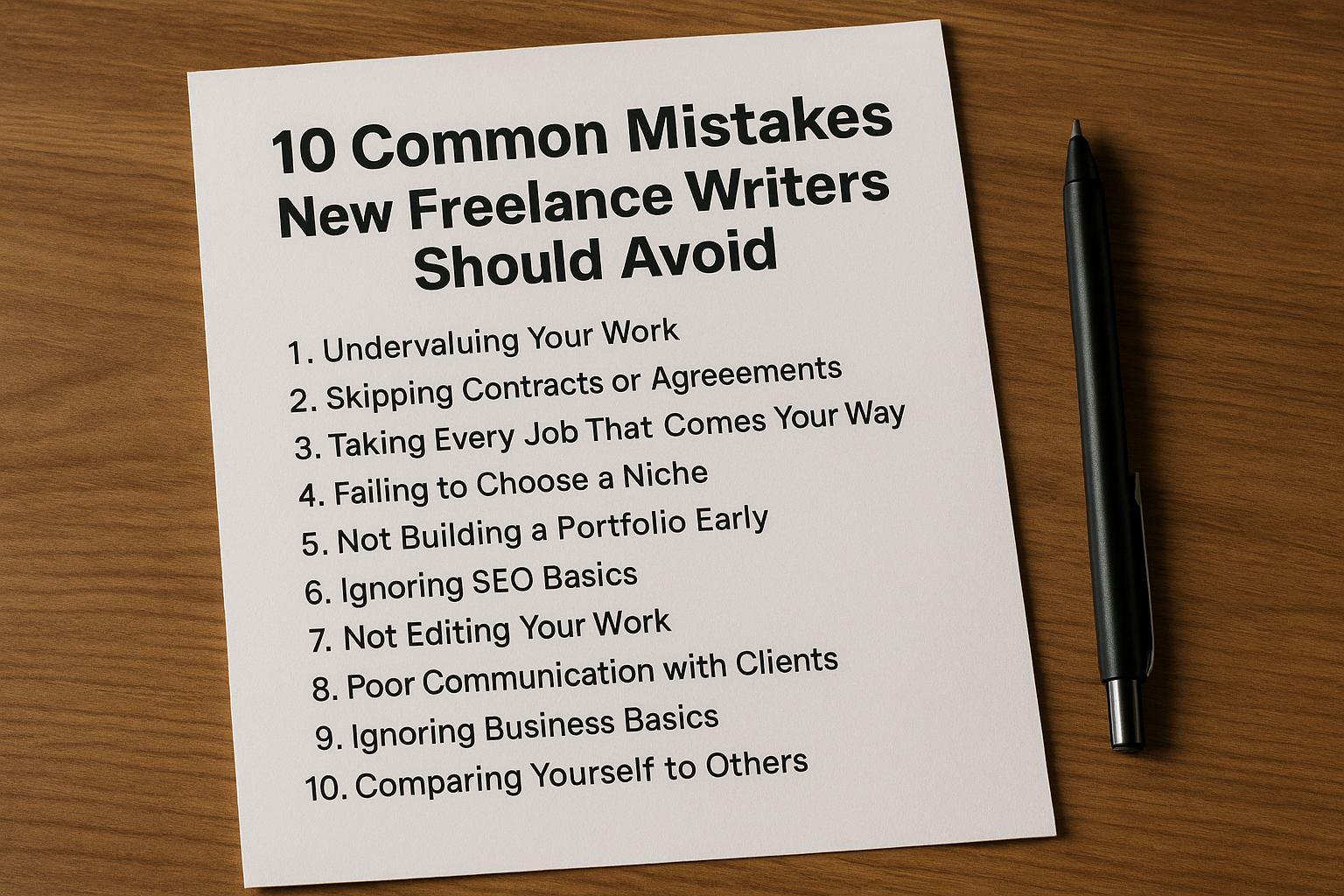Starting a freelance writing career is exciting, but it also comes with challenges — especially for beginners. Many new writers make similar mistakes that can cost them time, money, and opportunities. The good news? These pitfalls are easy to avoid once you’re aware of them.
In this article, we’ll cover 10 of the most common mistakes new freelance writers make and how you can avoid them to build a stronger, more successful writing business.
1. Undervaluing Your Work
One of the biggest mistakes beginners make is charging too little — or worse, working for free. While building experience is important, undervaluing your work sets the wrong precedent.
Why this matters:
- You attract low-paying clients who expect more for less.
- It becomes harder to raise your rates later.
- You risk burnout from overworking for little return.
What to do instead: Start with fair entry-level rates and increase them as your skills and portfolio grow. Know your minimum acceptable rate and stick to it.
2. Skipping Contracts or Agreements
New freelancers often trust verbal agreements or informal messages. Unfortunately, this can lead to unpaid work, misunderstandings, or scope creep.
Why this matters:
- A contract protects both you and the client.
- It outlines expectations, deadlines, payment terms, and revision policies.
What to do instead: Use a simple freelance writing contract or written agreement. There are free templates online, or you can use platforms like Bonsai or HelloSign.
3. Taking Every Job That Comes Your Way
It’s tempting to say “yes” to every opportunity when starting out. But not all clients or gigs are worth your time — especially if they’re far outside your interests, expertise, or values.
Why this matters:
- You could burn out or get stuck doing low-value work.
- You delay building expertise in a niche.
What to do instead: Be selective. Take work that helps you build your portfolio or aligns with your goals, and don’t be afraid to say “no” when something doesn’t feel right.
4. Failing to Choose a Niche
Writing about everything might seem like a good way to attract clients — but it often backfires. Without a clear focus, it’s harder for potential clients to know if you’re right for them.
Why this matters:
- Specialization makes marketing easier.
- Clients prefer writers who understand their industry.
What to do instead: Choose one or two niches that interest you (e.g., health, tech, travel). Over time, you can expand as needed.
5. Not Building a Portfolio Early
A writing portfolio is your #1 marketing tool. Waiting until you have a paid gig to build one is a mistake.
Why this matters:
- Clients want to see samples before hiring you.
- A portfolio proves your writing ability, even without experience.
What to do instead: Create 2–3 high-quality samples in your chosen niche(s). Use Medium, Google Docs, or a portfolio site like Clippings.me.
6. Ignoring SEO Basics
Most freelance writing jobs involve writing for the web. If you don’t understand how SEO works, your content might not perform — and clients will notice.
Why this matters:
- SEO helps content rank on Google and attract traffic.
- Many clients expect SEO knowledge as a basic skill.
What to do instead: Learn SEO fundamentals — keyword usage, meta descriptions, internal linking, etc. Free resources from Moz and HubSpot are a great start.
7. Not Editing Your Work
Submitting a first draft full of grammar issues or awkward phrasing can damage your credibility — even if your ideas are good.
Why this matters:
- Clean writing builds client trust.
- It reduces the need for revisions.
What to do instead: Always proofread your work. Use tools like Grammarly or Hemingway, but don’t rely on them alone. Read your article out loud before submitting.
8. Poor Communication with Clients
Communication makes or breaks client relationships. Being slow to respond, unclear about deadlines, or defensive about feedback can lead to frustration.
Why this matters:
- Good communication sets expectations and builds trust.
- It helps prevent misunderstandings and conflict.
What to do instead:
- Be clear and timely in your emails.
- Confirm project details before starting.
- Be open to constructive criticism and handle it professionally.
9. Ignoring Business Basics
Freelance writing is a creative job, but it’s also a business. Many new writers neglect the financial, legal, and organizational aspects.
Why this matters:
- Tracking income and expenses is essential for taxes.
- Invoicing and payments must be handled professionally.
What to do instead:
- Use tools like Google Sheets, Wave, or FreshBooks to manage finances.
- Set up a simple system for contracts, invoices, and deadlines.
- Treat clients like business partners, not just creative collaborators.
10. Comparing Yourself to Others
It’s easy to look at experienced writers with dozens of clients and feel like you’re behind. But comparison often leads to self-doubt and imposter syndrome.
Why this matters:
- Everyone starts somewhere — you don’t see their full journey.
- Comparison can distract you from your own progress.
What to do instead:
- Focus on your own growth.
- Set personal goals based on your values and pace.
- Celebrate your wins, no matter how small.
Final Thoughts: Learn Fast, Grow Steady
Mistakes are part of the learning process. The most successful freelance writers didn’t get there overnight — they made plenty of missteps and learned along the way.
By avoiding these common pitfalls early on, you’ll set yourself up for faster growth, better clients, and more confidence in your freelance writing journey.
Remember: it’s not about being perfect — it’s about being prepared, professional, and persistent.
